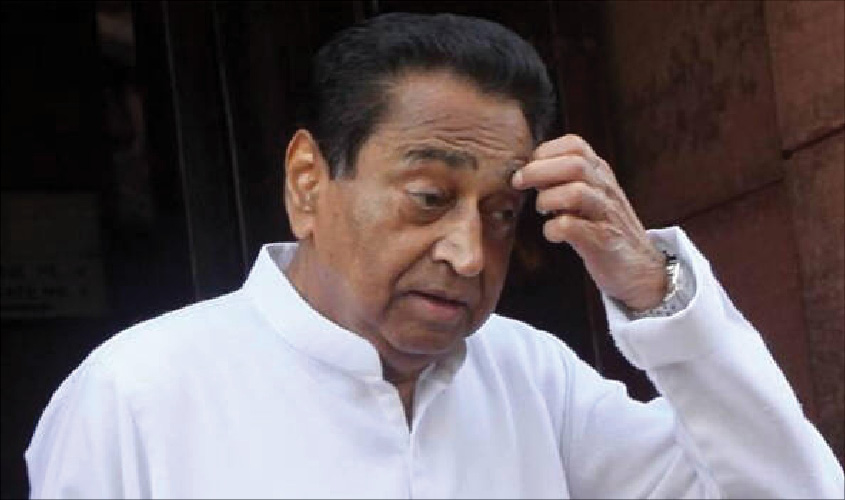Without a shadow of doubt, former Madhya Pradesh Chief Minister and nine-time Member of Parliament, Kamal Nath, continues to be the only senior Congress leader whose full potential is yet to be realised. He is a person who leads from the front, and if the party was able to form a government in Central India’s largest state, it was solely on account of his efforts.
His reputation of being an accomplisher for his electorate had travelled way beyond his Lok Sabha constituency of Chhindwara—now represented by his son, Nakul Nath—and when he was made the state party chief, the workers ensured that the 15-year rule of the Bharatiya Janata Party ended in 2018. Predictably, he was chosen to head the government and his election became a foregone conclusion when state leaders supported him wholeheartedly.
On Friday, unable to secure the numbers, following the resignation of 22 MLAs, Kamal Nath stepped down, tendering his resignation to the Governor. This would not have been so, had the party high command dealt with rebel Jyotiraditya Scindia on time, giving him walking orders, after he had deleted the Congress from his Twitter handle a few months ago. The message would have gone down to the rank and file, and the majority of those who ultimately sided with Scindia, would have fallen in line. It is well-known that the grassroots workers of the Congress admired the CM and if they had any reservations, they were primarily about either Scindia or Digvijaya Singh.
Kamal Nath is the product of the Sanjay Gandhi school of politics, which virtually groomed all principal leaders who occupy key positions in the Congress even today, 40 years after Indira Gandhi’s younger son passed away, under mysterious circumstances, in a plane crash. In fact, he and Akbar “Dumpy” Ahmed, were Sanjay’s classmates in Doon School and were amongst his most trusted associates. Kamal was also close to Rajiv, who was two years his senior, and therefore consolidated his position within the party, after he proved his competence on innumerable occasions.
In March 1977, when Sanjay Gandhi contested his maiden Lok Sabha election from Amethi against Ravindra Pratap Singh, it was the duo of Kamal Nath and Akbar Ahmed who were his constant companions. While Akbar travelled with both Sanjay and Maneka during the campaign, Kamal looked after important logistics. He was always considered a proficient organiser and this reflected in his actions. Sanjay lost the election like all others in Uttar Pradesh, including former Prime Minister Indira Gandhi from adjoining Rae Bareli. Many of his companions deserted him but Kamal Nath stood firmly by his side in this hour of crisis.
During his most difficult phase, when he was facing the wrath of the Janata Party government, Kamal was inseparable from Sanjay, accompanying him everywhere. I vividly recall that when the Supreme Court cancelled Sanjay’s bail, there were merely three persons who were with him in the Matador van, he was driving in order to surrender at the Tis Hazari courts; these were Maneka, Kamal Nath and Delhi Youth Congress leader Prem Swarup Nayyar. An interesting incident took place en route as the van driven by Sanjay approached the ITO crossing. A police vehicle was acting as an escort, but at the intersection, instead of turning right, Sanjay drove straight on to the Bahadur Shah Zafar Marg, dodging the police vehicle that had already made a detour.
Sanjay smiled mischievously at the others, switching on a high-frequency transistor set that was in his vehicle. The police wireless message was clearly audible announcing that Sanjay had given the cops a slip and was absolutely untraceable. It is another matter that Sanjay surrendered at the designated court and was behind bars for nearly a month at the Tihar Jail. Again, it was Kamal Nath who dealt with coordinating the situation and it was Prem Swarup Nayyar, who worked overtime, for the release, on bail of Youth Congress activists, who followed their leader to the prison.
Kamal Nath was a key-figure when Sanjay subsequently used to meet Raj Narain, at industrialist Kapil Mohan’s house on Pusa Road, to plan the fall of the Janata Party government. He played a crucial role in assisting Sanjay and Indira Gandhi decide on tickets for the 1980 Lok Sabha polls, and played the same vital part in short-listing nominees for the Uttar Pradesh Assembly elections. In fact, the list of candidates approved by the high command was diligently kept on the dashboard of his car, as he provided information to ticket aspirants concerning their selection.
Kamal Nath is easily the most structured and experienced politician in the Congress camp and perhaps, still has it in him to lead the party towards its revival. There is probably none else, amongst the senior leaders, who has the ability to both negotiate with potential alliance partners as well as infuse confidence amongst the diminishing strength of party workers. He is pragmatic and acceptable and could serve as a very capable spearhead in most of the elections. The acceptability of the Gandhis is on the decline, and while Bhupinder Singh Hooda can head the organisation, Kamal Nath can be entrusted with the task of being the leader of the Parliamentary Party. In this scenario, he could be the possible Prime Ministerial face of the Congress.
Without any further delay, the Congress, if it wants to resuscitate itself, should get him a berth in Rajya Sabha in June. He should, as soon as possible, reassume a Central role. Between us.

